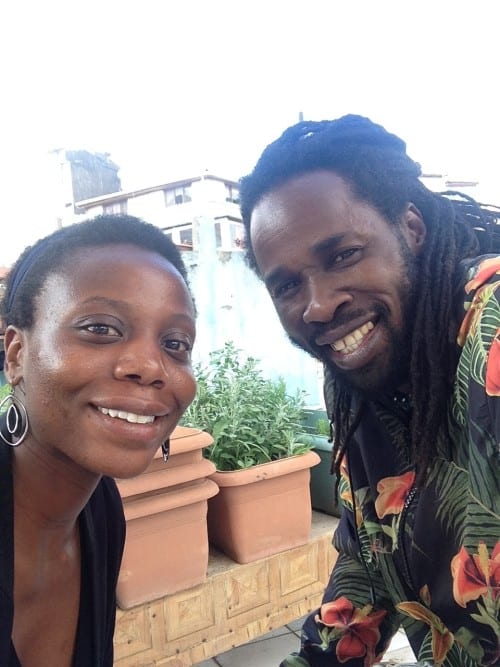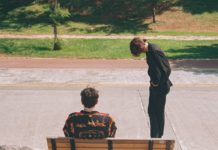Foreigners living in big cities all have something in common: the desire to live a better life. Most of them remain anonymous, but some, like the musician Enzo Ikah, stand out and make a difference in their new country.
According to the United Nations High Commissioner for Refugees, 60 million people were displaced due to political unrest or violent conflicts in 2014. In the inspiring documentary “Refugee: Here I Am”, Ikah proves that there is hope for the millions of people who are forced to flee their home countries. His could have been another refugee story. However, he has used his music as a way to raise awareness and inspire people in Congo, Turkey and beyond.
I had the chance to sit with the charismatic Ikah, who was generous enough to share insights about his journey from being a child in Congo to becoming a prominent musician in Turkey.

Enzo Ikah’s affair with music started long before he was born. “I did not choose music, music chose me,” he says. “I received the gift of telling stories from my great grandfather, Ikah Kivaga, who was a well-respected poet in our community.” Indeed, Mr. Kivaga’s poems are still used today in weddings, celebrations and as a way to pass on culture to the younger generations. “After living more over 100 years, he lost his sight but still had his wisdom”, Enzo adds. “When he was near the end of his life, my mother Theresa, who was pregnant, and my grandmother Agnes paid him a visit. The old man shook my mother’s hand he and asked, ‘How many people are here?’ ‘Only two,’ replied my mother. ‘What about the little boy? I see three people,’ he replied. A few days later, as Ikah’s great grandfather lay on his deathbed, he told Enzo’s mother, “My body is dying, but my spirit will come back and live through your son.” Thirty minutes after he was buried, Enzo Ikah was born.
Growing up, Enzo heard that story many times but didn’t pay much attention to it until his teenage years. “My belief in reincarnation fluctuates”, he says playfully. “Sometimes I believe in it, sometimes I don’t.” He pauses for a moment to think. “What I know for sure is that music was always around me. My grandmother used to sing when I was helping her in the fields. After awhile I started to sing along. At 16, I wrote my first song. I’ve been trying to share my message of hope and peace since then.”
He gradually became a prominent musician in Congo and toured with some of the greats such as Koffi Olomide, the father of African romantic rhumba. Ikah’s promising career took a hard turn as the lyrics of his songs started to infuriate the government.
“The message in my songs is like quinine; it’s bitter but necessary. I wrap it up with chocolate because I believe there is always hope even in the darkest situations,” he says, smiling. Ikah was forced to flee his native Congo after being sentenced to 10 years in jail for promoting civil disobedience. Yet, he never lost sight of his ultimate goal of using music to advocate for a unified humanity.
The song “Injustice” embodies this philosophy.
Ikah uses a metaphor to describe the challenges of moving to Istanbul: “In Lingala (Congo’s traditional language), the Ikah lion means a “lone” or “free” lion. Unlike the other lions, who rely on the females to hunt and bring the food, the Ikah lion only relies on himself. He has to take all the risks to eat and survive. Regardless of the difficulties, I believe that I am the master of my own destiny.”
The song “Somebody”, a track from his upcoming album, is an appeal for people to make their own choices about the way they live.
Ikah says that he gets his strength from his grandmother Agnes, who taught him about the power of humility and belief in oneself. “I was working as a porter in my early days in Istanbul when I heard someone playing music somewhere in Galata,” he recalls. “I told him I was a musician. We played together, and he offered me a guitar. Then I started to give music lessons to a young Turkish boy. His family took me in and treated me as one of their own. Six years later, I am about to launch my fifth studio album. Humility and faith allow you to seize opportunities even in the darkest situations.”
In “Red, Black and White”, Ikah urges people to rise above prejudices and seek unity.
Over the years, Ikah has become an inspiring figure, especially for young people. Ikah earned a degree in Psychology from the prestigious Collège de Sorbonne in Paris. He makes use of his expertise working as a counselor for young refugees living in Istanbul through the Union of Young Refugees in Istanbul.
When he discusses the situation of African migrants who are risking their lives chasing the “European dream”, he identifies two types of migrants: those who are pursuing the right to live in peace, and those who are running after illusions. “If your country is at war, of course, you should leave because everybody deserves to be safe. But once you arrive in your new country, you have to raise yourself up. Everyone has talent. Governments who accept refugees must give the newcomers a chance. It will benefit their countries and get rid of the negative stereotypes about immigrants.”
The song “No Home” is an hymn for all the migrants looking for a better life in unfamiliar lands.
He is more critical of refugees who leave their countries for economic reasons, however. “A trip to Europe costs thousands of dollars. Once you get there, you have nothing left and you will find a low-paying job at best. You will never be able to save money. Africans need to believe in and invest in their own countries if they want to see the continent’s economic growth.”
In the upcoming weeks, Ikah will start promoting “Love Is Love”, his fifth album, and will continue to grace the Istanbul music scene with the Enzo Ikah Band.
For more information on this artist, check out his website.










Hope and success. Nice article!
Enzo is an amazing musician and friend